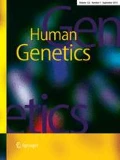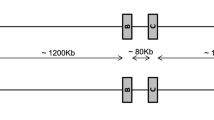Abstract
To determine whether convergent or trans-specific evolution is responsible for the persistence of the ABO polymorphism in apes, we have sequenced segments of introns 5 and 6 of the ABO gene. Four substitutions and one insertion or deletion group human A, B, and O alleles together, separate from their chimpanzee A and gorilla B counterparts. No shared substitutions support a trans-species mode of evolution for any of the alleles examined. We conclude that the A and B antigens of the chimpanzee and gorilla, respectively, have arisen by convergent evolution. Phylogenetic analysis suggests that the human A and B alleles are ancient, having diverged at least 3 million years ago. These alleles must have therefore been trans-specifically inherited within the genus Homo.
Similar content being viewed by others
Author information
Authors and Affiliations
Additional information
Received: 28 May 1997 / Accepted: 31 July 1997
Rights and permissions
About this article
Cite this article
O’hUigin, C., Sato, A. & Klein, J. Evidence for convergent evolution of A and B blood group antigens in primates. Hum Genet 101, 141–148 (1997). https://doi.org/10.1007/s004390050603
Issue Date:
DOI: https://doi.org/10.1007/s004390050603




